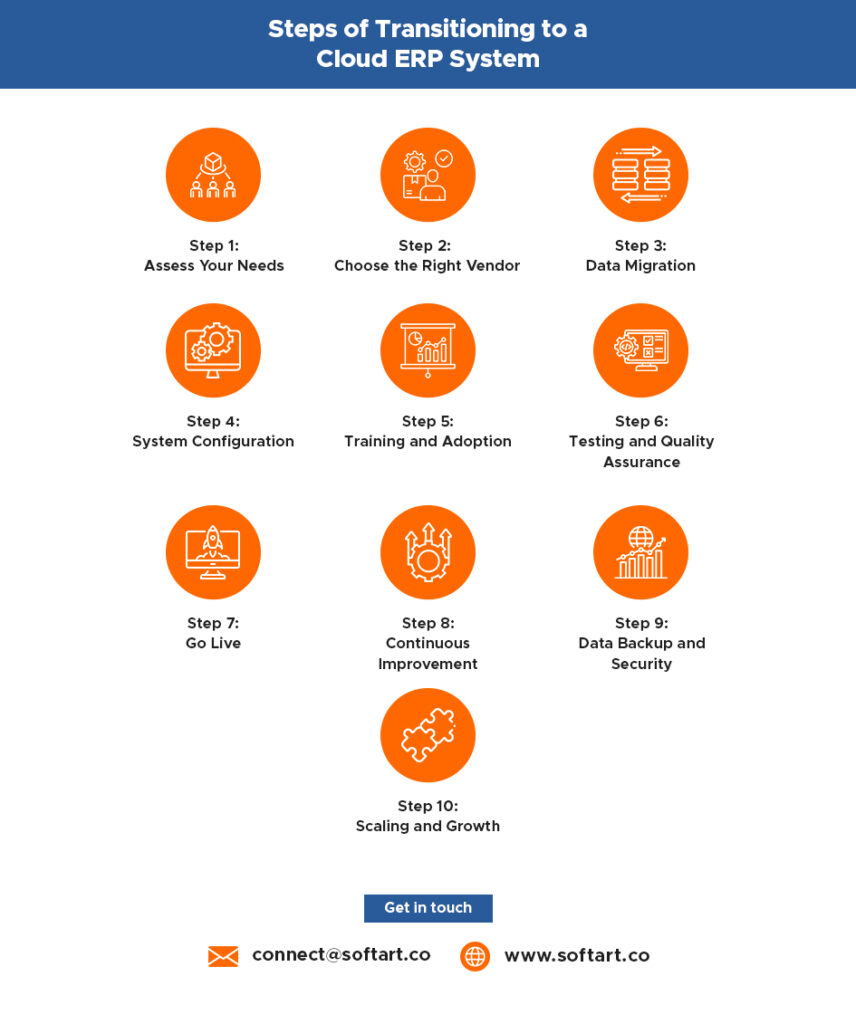
In the fast-paced digital era we live in, businesses are constantly looking for ways to improve efficiency, reduce costs, and stay competitive. This is where cloud-based ERP software comes in. Acumatica ERP is one such cloud based ERP that is popular with most of the business owners.
With its ability to streamline operations, enhance productivity and lower expenses, it’s no wonder that more and more organizations are making the switch to this innovative technology.
Let’s learn more about this technology
You may be wondering, what exactly is a cloud-based ERP software? ERP, or Enterprise Resource Planning, is a type of software that helps businesses manage and integrate their essential processes. Cloud ERP, specifically, refers to ERP software and tools that are hosted on a cloud computing platform, rather than on-premise servers.
This modern approach to ERP brings with it a multitude of benefits. Not only does it eliminate the need for expensive hardware and software, but it also provides businesses with greater flexibility, scalability, and accessibility. With cloud ERP, employees can access important information and systems from anywhere, at any time, using any device with an internet connection.
To delve further into the world of cloud-based ERP software service, we must first understand its structure. Essentially, it is a service that lives in the cloud. Instead of purchasing hardware and servers, businesses subscribe to a cloud service and access their ERP software over the internet.
The beauty of this arrangement is its simplicity. There’s no need for a complex IT infrastructure or a team of experts to manage it. Instead, the cloud service provider handles all the technical aspects, including maintenance, updates, and security. This allows businesses to focus on what they do best – serving their customers.
Now that we’ve established what cloud ERP is, let’s explore exactly how it can save your business time and money.
Cloud ERP systems enable businesses to streamline their operations by centralizing data and processes. This eliminates the need for manual data entry, reduces errors, and frees up valuable employee time. For example, routine tasks like invoicing, order processing, and inventory management can be automated, allowing your team to focus on more strategic activities.
One of the key advantages of Cloud ERP is the ability to access real-time data from anywhere with an internet connection. This empowers decision-makers to make informed choices quickly. Whether you’re in the office, on the road, or working remotely, having instant access to critical business data can save both time and money by facilitating faster and more accurate decision-making.
Cloud ERP solutions are highly scalable, allowing businesses to pay for only the resources and features they need. This scalability eliminates the need for large upfront investments in hardware and software, reducing capital expenditure. With Acumatica cloud ERP you can easily scale your ERP system up or down to accommodate changing needs, minimizing wastage.
Cloud ERP fosters collaboration and productivity by providing a unified platform where teams can access shared data and collaborate seamlessly. With features like document management, task assignment, and integrated communication tools, employees can work more efficiently, which translates to time saved and increased output.
Traditional on-premises ERP systems often come with high maintenance and IT infrastructure costs. Cloud ERP eliminates the need for in-house server rooms, extensive IT staff, and costly software updates. Service providers take care of system maintenance, security, and updates, allowing your IT team to focus on strategic projects rather than routine maintenance.
When it comes to cloud ERP, there are several solutions available that cater to different business needs. Let’s take a look at four strategic ERP cloud solutions.
While Cloud ERP systems offer value to businesses of all sizes, they are particularly beneficial for small businesses. With limited resources and budget, small businesses can greatly benefit from the cost savings, scalability, and efficiency that cloud ERP systems provide.
Moreover, cloud ERP systems for small businesses often come with industry-specific modules, making them a tailored solution that can help drive growth and competitiveness. They also offer mobile access, empowering employees to work from anywhere, further enhancing flexibility and productivity.

Transitioning to a cloud ERP system may seem daunting, but with careful planning and the right partner, it can be a smooth process.
Firstly, it’s important to clearly define your business needs and goals. This will help you choose a cloud ERP solution that is the best fit for your business.
Next, prepare your team for the change. This includes training them on the new system and addressing any concerns they may have.
Finally, ensure you have reliable support during the transition. This could be from your cloud ERP provider or a trusted ERP partner.
When making the switch to a cloud ERP system, having a trusted ERP partner like SoftArt can make all the difference. With their expertise and experience, they can guide you through the entire process, ensuring a seamless transition.
Moreover, they offer ongoing support, ensuring that you get the most out of your cloud ERP system. This includes regular updates, troubleshooting, and user training.
In conclusion, cloud-based ERP software is no longer a luxury, but a necessity for businesses looking to stay competitive in today’s digital age. By making the switch, you can streamline your business processes, improve efficiency, reduce costs, and ultimately, drive business success.